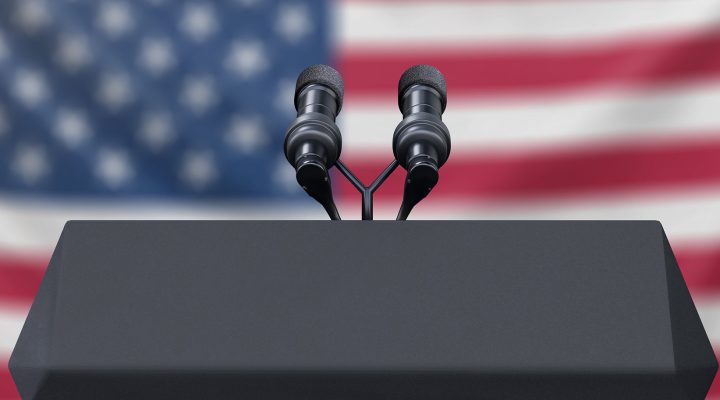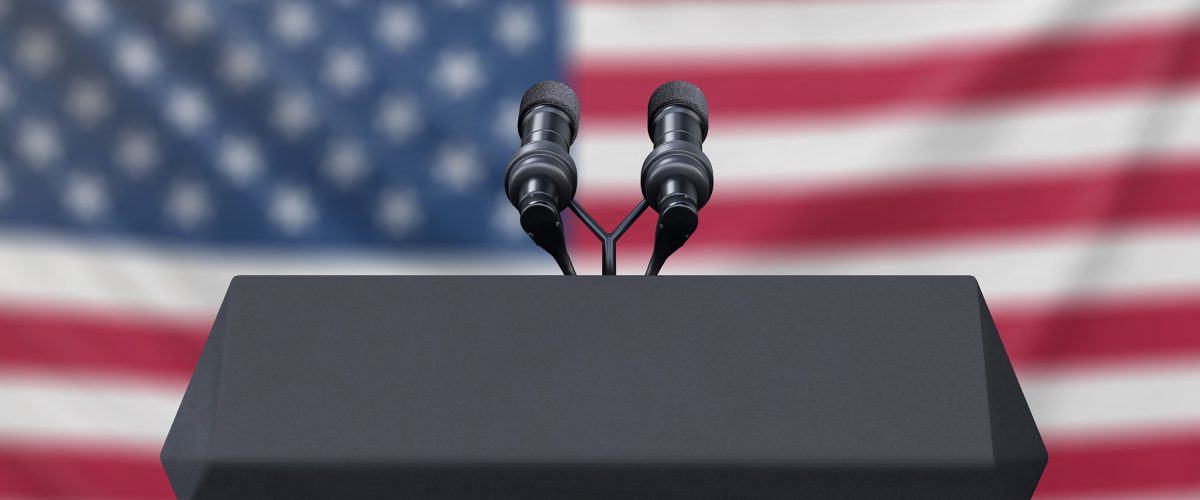If your pastor were to stand in the pulpit this Sunday and explicitly tell you to vote for either Donald Trump or Kamala Harris for president, would your church be in legal jeopardy?
Technically, yes. Realistically, no.
The potential peril would stem from such an endorsement being a clear violation of the Johnson Amendment, a 1954 provision in the U.S. tax code that prohibits all 501(c)(3) nonprofit organizations from endorsing or opposing political candidates.
The reality, though, is that the IRS has enforced the Johnson Amendment only one time in 70 years. Still, the presence of the law on the books has tempered the potential violations of most pastors in America — until the era of Donald Trump. Some high-profile evangelical supporters of Trump have gleefully endorsed him in every way imaginable while thumbing their noses at the Johnson Amendment and hoping they get sued and can challenge the law in court.
One group led by the National Religious Broadcasters has sued the IRS to overturn the Johnson Amendment. That case is pending. Donald Trump claims while he was president he killed the Johnson Amendment, but the reality is he did not. A bill to repeal the amendment was killed by the Senate parliamentarian on a procedural move.
Still, Trump pledges if he’s sent back to the White House he will kill the Johnson Amendment once and for all. The president alone doesn’t have that power — yet.
“If there’s another less-enforced federal law on the books, it would be hard to know what it is.”
If there’s another less-enforced federal law on the books, it would be hard to know what it is. The Johnson Amendment is a law conservative leaders love to hate but a law most Americans think needs to stay in place and be enforced.
A 2022 Pew poll found 77% of Americans oppose houses of worship intervening in partisan politics by endorsing or opposing candidates for public office. Average people are concerned about melding politics and religion. People more attuned to politics are concerned about so-called “dark money” flowing through churches into political campaigns.
Imagine a church or its subsidiary donating $100,000 to a presidential campaign or a Senate campaign or any other campaign. In most American churches, that would cause a major schism.
But in the age of Trumpism, the American church has become more politically segregated anyway. It is increasingly hard to find a “purple” church with an equal mix of blue Democrats and red Republicans.
Conservatives claim the Black church has violated the Johnson Amendment for decades with its close association with Democratic politics. Especially from the Civil Rights Movement forward, prominent Black churches have been mandatory campaign stops for Democratic candidates, who often speak from the pulpit.
Most often, Black church leaders say they aren’t explicitly endorsing a candidate but merely giving space for community leaders to be seen and heard. Yet it has been rare to find a Republican candidate for national office speaking at a historic Black church.
Over the past two decades, white evangelical churches have taken their own risks by increasing alignment with the Republican Party and Republican candidates — who also often speak from the pulpits and get prayed over by pastors.

Franklin Graham, president and CEO of the Billy Graham Evangelistic Association, arrives to speak on the fourth day of the Republican National Convention at the Fiserv Forum on July 18, 2024, in Milwaukee, Wisconsin. (Photo by Andrew Harnik/Getty Images)
When Franklin Graham recently appeared at a Trump rally and prayed for God to send the former president back to the White House, he did so, he said, as a “private citizen.” That’s a fine line most people cannot parse. When is an ordained minister not a minister?
Southern Baptist pastor Jack Graham made no such pretense this week when he joined televangelist Paula White in praying over Trump at a rally.
Right now, any efforts to rally Congress or the courts to repeal the Johnson Amendment are wasted breath because the law is not being enforced anyway. There is a 99.9% probability if you blatantly violate the Johnson Amendment you will not be held accountable in court.
“There is a 99.9% probability if you blatantly violate the Johnson Amendment you will not be held accountable in court.”
You might be held accountable by your congregation, however, which is why the vast majority of American pastors want the Johnson Amendment to stay on the books.
Some keen readers have wondered whether BNG violates the Johnson Amendment with our opinion writing that is strongly opposed to Trump on religious and moral grounds. We are, after all, a nonprofit organization.
Here’s why the Johnson Amendment is difficult to enforce and why the IRS seldom makes the effort. Enforcing it requires delineating between free speech protected by the First Amendment and political speech masquerading as religious belief.
In our case, the well-established legal doctrines of a free press supersede concerns about being a nonprofit. Protections for a free press are the same whether that press is for-profit or nonprofit.
Which could lead to an interesting conversation about free speech and sermons in churches. That’s why the Johnson Amendment is so rarely enforced.
For now, Congress and the courts and the IRS seem to have decided it’s better to have an unenforced law on the books than to try to craft a better law that might open a new can of worms.
Related articles:
Does the Johnson Amendment have any teeth left?
Baptist Joint Committee exec says saving Johnson Amendment a win for religious liberty
Franklin Graham prays aloud for Trump to win the election
Jack Graham prays over Trump at Paula White’s National Faith Summit


